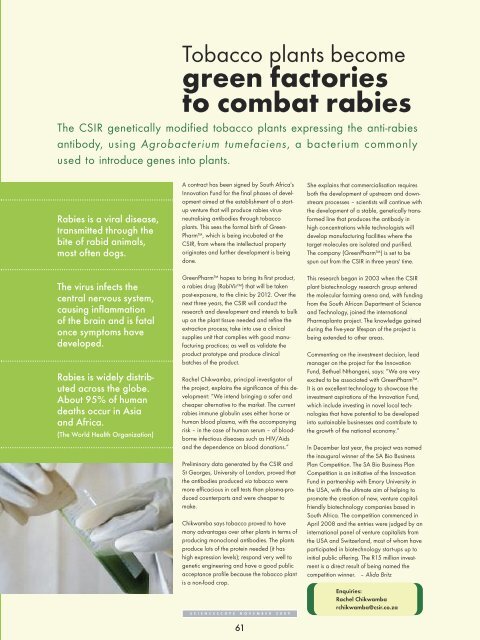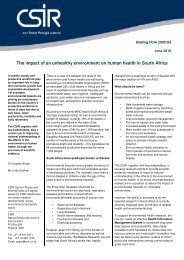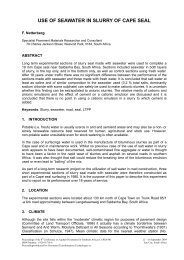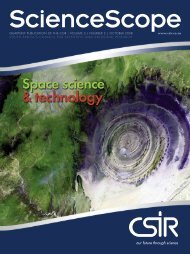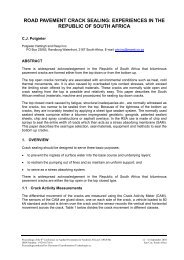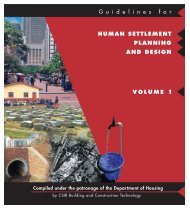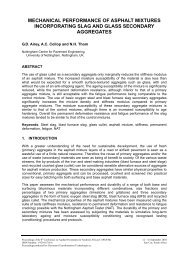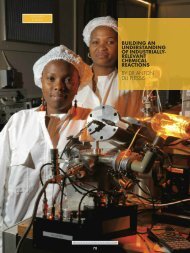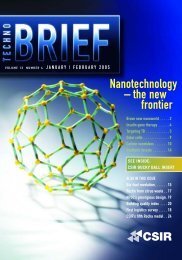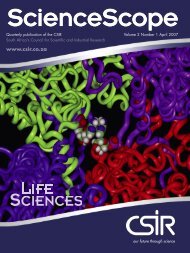Rabies - CSIR
Rabies - CSIR
Rabies - CSIR
You also want an ePaper? Increase the reach of your titles
YUMPU automatically turns print PDFs into web optimized ePapers that Google loves.
Tobacco plants become<br />
green factories<br />
to combat rabies<br />
The <strong>CSIR</strong> genetically modified tobacco plants expressing the anti-rabies<br />
antibody, using Agrobacterium tumefaciens, a bacterium commonly<br />
used to introduce genes into plants.<br />
<strong>Rabies</strong> is a viral disease,<br />
transmitted through the<br />
bite of rabid animals,<br />
most often dogs.<br />
A contract has been signed by South Africa's<br />
Innovation Fund for the final phases of development<br />
aimed at the establishment of a startup<br />
venture that will produce rabies virusneutralising<br />
antibodies through tobacco<br />
plants. This sees the formal birth of Green-<br />
Pharm, which is being incubated at the<br />
<strong>CSIR</strong>, from where the intellectual property<br />
originates and further development is being<br />
done.<br />
She explains that commercialisation requires<br />
both the development of upstream and downstream<br />
processes – scientists will continue with<br />
the development of a stable, genetically transformed<br />
line that produces the antibody in<br />
high concentrations while technologists will<br />
develop manufacturing facilities where the<br />
target molecules are isolated and purified.<br />
The company (GreenPharm) is set to be<br />
spun out from the <strong>CSIR</strong> in three years' time.<br />
The virus infects the<br />
central nervous system,<br />
causing inflammation<br />
of the brain and is fatal<br />
once symptoms have<br />
developed.<br />
<strong>Rabies</strong> is widely distributed<br />
across the globe.<br />
About 95% of human<br />
deaths occur in Asia<br />
and Africa.<br />
(The World Health Organization)<br />
GreenPharm hopes to bring its first product,<br />
a rabies drug (RabiVir) that will be taken<br />
post-exposure, to the clinic by 2012. Over the<br />
next three years, the <strong>CSIR</strong> will conduct the<br />
research and development and intends to bulk<br />
up on the plant tissue needed and refine the<br />
extraction process; take into use a clinical<br />
supplies unit that complies with good manufacturing<br />
practices; as well as validate the<br />
product prototype and produce clinical<br />
batches of the product.<br />
Rachel Chikwamba, principal investigator of<br />
the project, explains the significance of this development:<br />
“We intend bringing a safer and<br />
cheaper alternative to the market. The current<br />
rabies immune globulin uses either horse or<br />
human blood plasma, with the accompanying<br />
risk – in the case of human serum – of bloodborne<br />
infectious diseases such as HIV/Aids<br />
and the dependence on blood donations.“<br />
Preliminary data generated by the <strong>CSIR</strong> and<br />
St Georges, University of London, proved that<br />
the antibodies produced via tobacco were<br />
more efficacious in cell tests than plasma-produced<br />
counterparts and were cheaper to<br />
make.<br />
Chikwamba says tobacco proved to have<br />
many advantages over other plants in terms of<br />
producing monoclonal antibodies. The plants<br />
produce lots of the protein needed (it has<br />
high expression levels); respond very well to<br />
genetic engineering and have a good public<br />
acceptance profile because the tobacco plant<br />
is a non-food crop.<br />
S C I E N C E S C O P E N O V E M B E R 2 0 0 9<br />
This research began in 2003 when the <strong>CSIR</strong><br />
plant biotechnology research group entered<br />
the molecular farming arena and, with funding<br />
from the South African Department of Science<br />
and Technology, joined the international<br />
Pharmaplanta project. The knowledge gained<br />
during the five-year lifespan of the project is<br />
being extended to other areas.<br />
Commenting on the investment decision, lead<br />
manager on the project for the Innovation<br />
Fund, Bethuel Nthangeni, says: “We are very<br />
excited to be associated with GreenPharm.<br />
It is an excellent technology to showcase the<br />
investment aspirations of the Innovation Fund,<br />
which include investing in novel local technologies<br />
that have potential to be developed<br />
into sustainable businesses and contribute to<br />
the growth of the national economy.“<br />
In December last year, the project was named<br />
the inaugural winner of the SA Bio Business<br />
Plan Competition. The SA Bio Business Plan<br />
Competition is an initiative of the Innovation<br />
Fund in partnership with Emory University in<br />
the USA, with the ultimate aim of helping to<br />
promote the creation of new, venture capitalfriendly<br />
biotechnology companies based in<br />
South Africa. The competition commenced in<br />
April 2008 and the entries were judged by an<br />
international panel of venture capitalists from<br />
the USA and Switzerland, most of whom have<br />
participated in biotechnology start-ups up to<br />
initial public offering. The R15 million investment<br />
is a direct result of being named the<br />
competition winner. – Alida Britz<br />
Enquiries:<br />
Rachel Chikwamba<br />
rchikwamba@csir.co.za<br />
61


